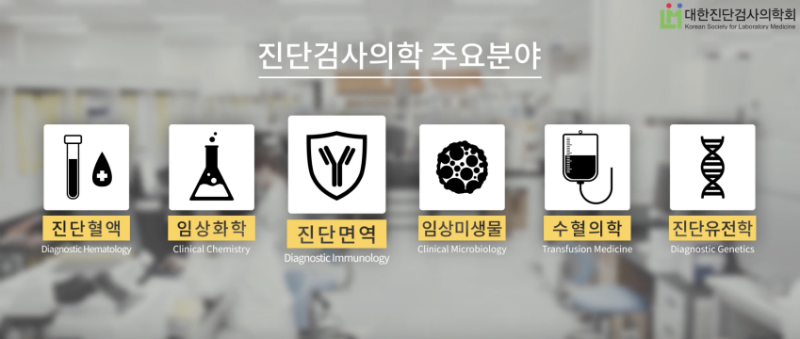Diagnostic tests are remarkably effective in modern medicine in that 70% of the clinical decisions were made by the physician with 5% cost. Reliable tests can assist in the rational decision making of the clinician to ultimately provide the patient with the best possible care.
The purpose of the diagnostic test can be divided into five categories: Diagnosis and differential diagnosis of the patient's disease, treatment policy based on the severity and progression of the disease, disease detection and prevention through health checkups and screening tests, determination of prognosis, and follow-up of treatment effects.
The Department of Laboratory Medicine covers major areas, such as diagnostic hematology, clinical chemistry, diagnostic immunology, clinical microbiology, transfusion medicine, diagnostic genetics, laboratory management, and field inspection.
In addition to the analysis of the different components in the blood, urine, cerebrospinal fluid, and body fluids, diagnostic tests are performed and different specimens are tested. We classify various microorganisms (e.g., bacteria, viruses, and fungi) in order to diagnose the infectious diseases of the human body. Meanwhile, the blood bank is responsible for supplying blood to all hospitals where blood transfusion is required, and various tests, blood donation, apheresis, and plasma exchange are also performed. The diagnostic genetic laboratory provides genetic information related to the disease through various genetic tests.
The rapid advancement of medical technology has opened the doors to a new era of future medicine, personalized medicine, and precision medicine. However, it seems impossible to immediately apply new medical and technological advancements to patient care.
The phrase “from bench to bedside” suggests that laboratory findings require a careful and rigorous evaluation process to be established as a clinical laboratory examination for patient care.
The role of the doctors majoring in laboratory medicine is to pursue the most cost-effective solution in addressing the needs of clinicians regarding new diagnosis and treatment guidelines, newly developed and commercially available diagnostic markers, and improved performing test methods.
The Department of Laboratory Medicine and the medical staff are committed in providing excellent medical care to patients by incorporating the latest medical knowledge and technology with various examination techniques.
- Major Areas of Laboratory Medicine
Diagnostic Hematology / Clinical Chemistry / Diagnostic Immunology / Clinical Microbiology / Transfusion Medicine / Diagnostic Genetics

* The video above is a promotional video of the Korean Society for Laboratory Medicine, which will provide information on the work of the Laboratory Medicine specialists.


